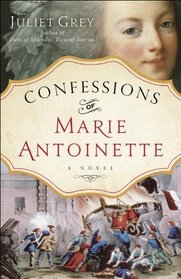Helpful Score: 2
This was an interesting read. Though it is the last of a trilogy, there is enough descriptive material that, in most cases, not reading the first two books will not be an impediment to enjoyment. The characters are well drawn and the descriptions are vivid enough to allow you to smell the "merde" stuck to the common shoes in the stews of Paris. Despite the fact we all know how the story ends, the finale is still compelling. The only negative is that there is a lot of French language used, and not all meanings can be gleaned from context. Highly recommended for fans of historical fiction.
Summary:
This is the final story of Grey's trilogy on Marie Antoinette. It focuses on the ending of her imprisonment and death instead of the lavishness of the previous two installments. This is definitely a tearjerker that investigates the love that she is beginning to feel for her husband, the king, the worry she has for her children, and some self-reflection on her previous choices. The surrounding French Revolution continues to add to the turmoil of this third book and really makes all characters (royalty included) sad, dejected, and heavy. Marie Antoinette is a real woman within this conclusion with far less of the childish ideas that she came to court with. While Grey does not completely transform Antoinette into a pious, completely misunderstood person that the reader should feel sorry for, Grey definitely opens all facets of the character for investigation.
My thoughts:
I know that I have included some of my thoughts already, but this is a deeply moving book. I don't exactly know why I did this, but I read this book first and am now going back and reading the happier books 1 and 2. As a stand alone book, this works fine. We know enough of the history in order to keep track of what is happening, the characters are still completely developed within this book, and this section of death is probably the most widely known part of the story. It is definitely a downer though. I admit that I was brought to tears and would have liked to have the first two books to help bolster me up for this transformation. Grey has a way with words. She easily paints a picture of both setting and character that few historical fiction writers strive for. I've noticed that a lot of historical fiction take the reader's knowledge of the history for granted and do not focus much on the world building. Grey does not do that. She takes her time and develops the whole picture. The French Revolution is almost a character in itself within this book. All of the uproar and devastation of the commoners feels as if a beloved character is suffering, being tortured, and dieing without any possible saviors. Altogether, this reads like it was a much shorter novel and goes great with a piece of cake.
This is the final story of Grey's trilogy on Marie Antoinette. It focuses on the ending of her imprisonment and death instead of the lavishness of the previous two installments. This is definitely a tearjerker that investigates the love that she is beginning to feel for her husband, the king, the worry she has for her children, and some self-reflection on her previous choices. The surrounding French Revolution continues to add to the turmoil of this third book and really makes all characters (royalty included) sad, dejected, and heavy. Marie Antoinette is a real woman within this conclusion with far less of the childish ideas that she came to court with. While Grey does not completely transform Antoinette into a pious, completely misunderstood person that the reader should feel sorry for, Grey definitely opens all facets of the character for investigation.
My thoughts:
I know that I have included some of my thoughts already, but this is a deeply moving book. I don't exactly know why I did this, but I read this book first and am now going back and reading the happier books 1 and 2. As a stand alone book, this works fine. We know enough of the history in order to keep track of what is happening, the characters are still completely developed within this book, and this section of death is probably the most widely known part of the story. It is definitely a downer though. I admit that I was brought to tears and would have liked to have the first two books to help bolster me up for this transformation. Grey has a way with words. She easily paints a picture of both setting and character that few historical fiction writers strive for. I've noticed that a lot of historical fiction take the reader's knowledge of the history for granted and do not focus much on the world building. Grey does not do that. She takes her time and develops the whole picture. The French Revolution is almost a character in itself within this book. All of the uproar and devastation of the commoners feels as if a beloved character is suffering, being tortured, and dieing without any possible saviors. Altogether, this reads like it was a much shorter novel and goes great with a piece of cake.




